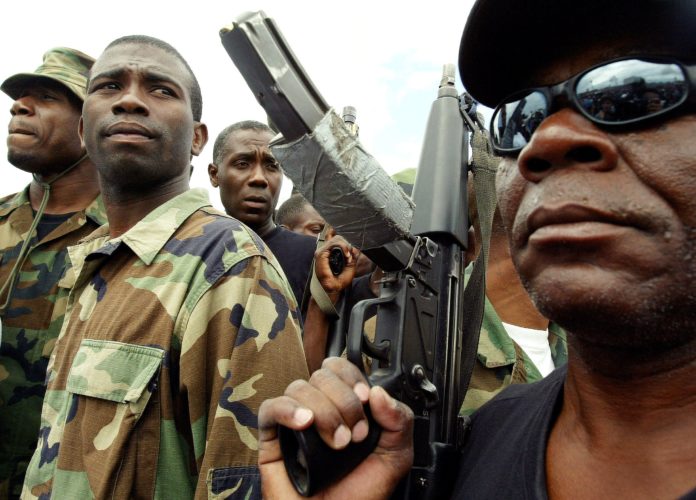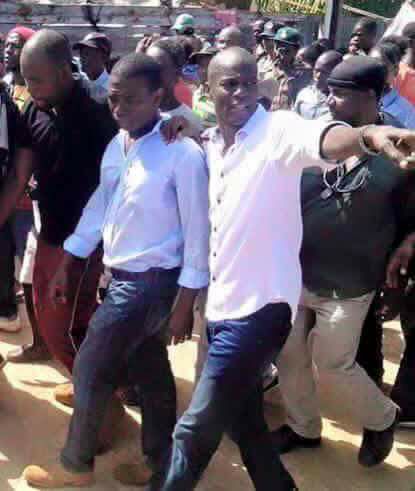
“What goes around, comes around,” says the proverb, and former Haitian “rebel” leader Guy Philippe must be pondering this karmic truth as he languishes in his Miami, FL jail cell.
In February 2004, he played a key role in helping U.S. Special Forces kidnap then President Jean-Bertrand Aristide from Haiti and whisk him off to a seven year exile in Africa. Today, Philippe claims, through his lawyer, that U.S. government agents illegally kidnapped him from Haiti on Jan. 5, 2017 and, with “shocking and outrageous” conduct, flew him to Florida to stand trial because he has “too much information” about Washington’s overthrow of Aristide.
In November 2005 (21 months after the coup against Aristide), a U.S. grand jury issued a three count indictment against Philippe for drug trafficking and money laundering between 1997 and 2001. After his arrest in Haiti and transport to Miami, Philippe pled not guilty to the charges through his Hollywood, FL-based lawyer, Zeljka Bozanic. On Feb. 28, 2017, she filed with U.S. District Court in Miami two motions to dismiss and one motion to abate (temporarily suspend) the case against Philippe.
One motion to dismiss argues that the U.S. took too long to arrest Philippe, 49, since the 2005 indictment. “[T]here was and has been no activity whatsoever and no effort by the United States to bring Mr. Philippe to trial until the Defendant’s kidnapping on Jan. 5, 2017,” Bozanic argues.
Whether through ignorance or dishonesty, this assertion is patently untrue, since agents of Haiti’s Anti-Drug Trafficking Brigade (BLTS) and U.S. Drug Enforcement Agency (DEA) made at least two highly-publicized joint raids to capture Philippe in Haiti in 2008 and 2009. Philippe, then living in the remote seaside village of Pestel, “narrowly escaped capture by fleeing on foot into the hills,” a Wikileaked 2009 U.S. Embassy cable explained.
Furthermore, prosecuting U.S. Attorney Wifredo Ferrer released a statement on Jan. 6 saying that “the passage of time does not thwart the unwavering commitment of [my] office and our local and international law enforcement partners to identify, apprehend, and prosecute narcotics traffickers and money launderers who threaten the global community.”
The second motion to dismiss argues that men “believed to be agents of the United States” arrested Philippe in Port-au-Prince on Jan. 5 and were ready to kill him. The Haitian government and witnesses say that Haitian police made the arrest without a struggle.
“We took him like a baby,” one Haitian police officer said, according to the Miami Herald.
For the first time, Guy Philippe has publicly admitted to his long-suspected collusion with Washington in Aristide’s 2004 overthrow.
Nonetheless, Bozanic decries that “Philippe’s head was covered by a hood” and that he “was held in a car for approximately three to four hours… [and] forced to sit on a very hot floor of the vehicle as the engine was right underneath him [sic]… without any food or water.”
“The Defendant here asserts that the conduct of the United States was so unconscionable as to constitute a violation of substantive due process,” Bozanic wrote, and “the United States actions should shock the judicial conscience of this Court sufficiently to trigger due process sanctions, including dismissal of the […] indictment.”
Bozanic admits that she “is aware of the Ker-Frisbie Doctrine which in essence states that once the Defendant is before the Court, the Court has jurisdiction over his person.” However, she still “moves to dismiss because the conduct of the United States was so outrageous that an exception to the Ker-Frisbee [sic] Doctrine does indeed apply.”
Most significantly, in the same motion, Bozanic says that “Mr. Philippe has been a thorn in the eyes [sic] of the United States Government for many years.” She says he “helped the United States oust former Haitian President Aristide in coup d’état [sic]” and that therefore he “simply had too much information and became a danger for the government of the United States.”
The statement is significant because it is the first time that Guy Philippe has publicly admitted to his long-suspected collusion with Washington in Aristide’s 2004 overthrow. Philippe’s force of a few hundred ragtag “rebels” in Cap Haïtien was used by U.S. Deputy Chief of Station Luis Moreno as a threat to browbeat Aristide into agreeing to leave his Tabarre home for an airport press conference on Feb. 29, 2004 (Philippe’s birthday). Instead, at the airport, Aristide, his wife, and his private security contingent were all forced to board an unmarked U.S. aircraft, on which they were flown to the Central African Republic. From exile the next day, Aristide called it a “modern-day kidnapping.”
In 2006, author Peter Hallward asked Guy Philippe in a long interview if he had received any assistance from the U.S. and France as he organized and outfitted his anti-Aristide “rebels” in the Dominican Republic from 2001 to 2004. Philippe was evasive but said: “There are some things I cannot reveal at this point, but everything’s in [my] book which will appear in 2012, whether or not I myself am still alive.” Philippe’s book has still not been published.

Bozanic also filed a “Motion to Abate” the proceedings against Philippe because he “is entitled to immunity as a foreign state official of Haiti.” Officials of interim President Jocelerme Privert’s government said that Philippe would have had immunity under Haitian law if he had been sworn in for a six year term as Senator for the Grand-Anse department, the post to which he was elected on Nov. 16, 2016. Also, under the 2015 electoral law, official Haitian candidates are immune from arrest and prosecution. However, the police team that captured Philippe chose the period between the Nov. 16 elections and the Jan. 9 swearing-in of new parliamentarians, when the senator-elect was legally vulnerable.
On Feb. 7, Jocelerme Privert, whom Bozanic calls “a longtime political enemy of Senator Philippe,” passed the presidential sash to Jovenel Moïse, who is a close political ally of the former neo-Duvalierist “rebel” leader. Meanwhile, in Washington, DC, President Donald Trump succeeded Barack Obama on Jan. 20. Prosecutor Ferrer, an Obama appointee, resigned his post on Feb. 15 and stepped down Mar. 3. He is replaced by his assistant Ben Greenberg until Trump names his successor, pending Senate approval.
Also on Feb. 28 (the court’s deadline for motions), U.S. Attorney Ferrer filed several motions in limine to prevent certain evidence from being presented by Philippe and his attorney. Most interestingly, Ferrer moved to prevent Philippe from “raising as a defense” that the monies he allegedly laundered “were derived – directly or indirectly – from the United States government or people authorized to work on behalf of the United States.” The reason? “The defendant’s failure to provide the adequate notice.”
Ferrer’s motions also seek to block Philippe’s official immunity defense as well as Philippe’s privilege of confidential marital communications with his wife, Natalie, who is a U.S. citizen. She also should not be able to invoke “her Fifth Amendment privilege to remain silent should she testify,” Ferrer said.
Bozanic – whose motions have grammatical errors, misspellings, and are missing many words – also asserts that “Philippe went to the U.S. Embassy [in Haiti] in 2006 [after the 2005 indictment] and was not arrested.” The U.S. State Department has not yet responded to Haïti Liberté’s queries as to whether Philippe did indeed visit the U.S. Embassy in 2006, and, if so, why, and what was discussed.
However, most importantly, both defendant Philippe’s and prosecutor Ferrer’s motions suggest that the financial and political links, deduced by many analysts, between Guy Philippe and Washington in Haiti’s 2004 coup d’état may finally be revealed… if the court allows it.









